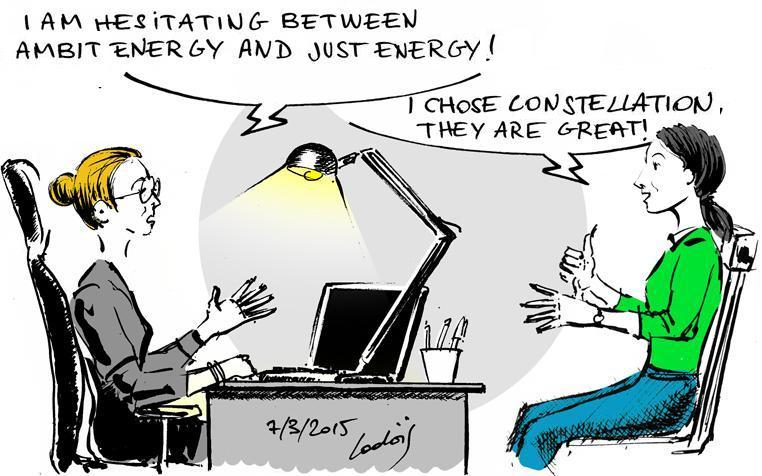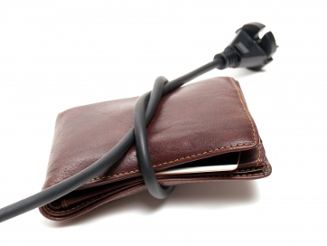Compare 5 Major Retail Energy Providers

Trying to choose a retail electric or natural gas provider? We give you a comparison of rate plans, contracts, customer reviews, and more for five big American energy providers.
Looking for the right Supplier?Whether you are starting service or looking to choose the cheapest rate for your energy, call us at phone currently not available to switch suppliers in minutes!
Includes analysis of Ambit Energy, Constellation, Direct Energy, Just Energy, and Xoom Energy.
Retail Providers Profiled
We provide our analysis on five of the largest retail energy providers in the United States in this article, including:
Each of these providers has over 1 million customers, and serves more than a dozen US states with both electricity and natural gas service.
They vary in a number of important ways, however. Read on to find out which retail providers offer competitive prices, are good at disclosing plan terms or sales practices, and more.
Our Recommendation

Constellation stands out from the pack for the following reasons:
- Competitive prices in most locations
- Globally transparent plan conditions
- High marks for customer service
- 90 day trial period delivers flexibility
In addition, Constellation consolidates customers' monthly bills with their local utility, a feature many appreciate.
The company also delivers a variety of green energy fixed-rateplans.
Comparison: Overview
We evaluate providers on a number of features, namely:
- Prices
- Contract lengths - Are they designed to help you save?
- Contract terms - Are they transparent? Fair?
- Reviews - What do customers and consumer agencies think?
These factors are important to making an informed decision about switching to a retail energy provider. Below we provide a summary of our findings, on a scale of 1-3 stars.
| Provider | Overall Score | Price Offers | Contract Lengths | Plan Features | Customer Reviews |
|---|---|---|---|---|---|
| Ambit Energy |
|
|
|
|
|
| Constellation |
|
|
|
|
|
| Direct Energy |
|
|
|
|
|
| Just Energy |
|
|
|
|
|
| Xoom Energy |
|
|
|
|
|
Prices
Though depending on where you live, Direct Energy and Constellation both offer good price options in many locations. Xoom Energy is a winner for competitive prices in some parts of the country and a loser in others, while Just Energy and Ambit Energy do not offer many attractive options.
Contract Lengths & Features
Contract lengths are important because they provide customers the flexibility to choose a plan that will meet their needs and also help them to save. Most of the providers we profile offer a decent array of options, while Direct Energy crushes the competition with plans for every need. Ambit Energy only offers variable rate plans, which are notoriously unstable and expensive.
Contract terms are moderately well-disclosed with most of our profiled retail energy providers. We prefer terms that are clearly-explained and accessible on the website, over terms that are hidden in hard-to-read contracts or difficult to find on companies' websites.
Constellation does a good job of disclosing their terms for customers who enter in their zip code information. In addition to quick bullet points with key information, customers can click on "Full Details" to get more information. As of March 2015, the side bar does not contain early cancellation fee information. Customers need to consult contract details to learn more.
Constellation's terms are fair, including a 90 day no-fee cancellation period.
Customer Reviews
Reviews vary among our providers, with Ambit Energy, Constellation, and Xoom Energy all earning relatively high marks. Direct Energy earns a moderate score for potentially not well-disclosed sales and contract terms, and Just Energy earns a low score for poor reviews and government action against the company.
Energy Offers in Depth
So what can a retail provider give you that your local utility cannot? The key is fixed rates, which can save you money over time. Fixed rates are almost never available with your local utility, and so this is the real advantage of retail energy providers.
Some companies provide an array of contract options, though most that we profile offer one or two choices of contract length per energy type that we recommend.
Early cancellation fees are a common feature among fixed rate plans with retail providers. The providers we feature charge cancellation fees that are around the same amount; some providers like Constellation will charge more or less as a function of how much time remains on your contract.
We compare fixed rate plans below on key contract features.
| Provider | Contract Lengths & Early Cancellation Fees | Plan Features | Our thoughts | Rating |
|---|---|---|---|---|
| Ambit Energy | Currently no fixed rate contracts - not recommended |
|
||
| Constellation |
|
|
|
|
| Direct Energy |
|
|
|
|
| Just Energy |
|
|
|
|
| Xoom Energy |
|
|
|
|
Ambit Energy currently only provides variable rates. Because we do not recommend variable rates,we do not recommend signing up for service with Ambit at this time.
How to Choose an Electric or Gas Plan
It is very important for residential consumers to compare plan options with different retail energy providers before committing to one. Contract conditions may not be readily disclosed, and there are important things to take into consideration - such as:
- Early cancellation fees
- Automatic renewal at the end of your term
- Monthly fees or fees to begin service
Plan and Contract Features
Most fixed rate plans with retail providers feature the following conditions:
- Rates remain the same for entire contract period
- Rates automatically become variable at the end of your contract term if no action is taken
- Advanced notice required to cancel or renew contract - even if you are doing it at the end of your contract term
- Usually 30-45 days notice required, often in writing
Most fixed rate plans do feature an early cancellation fee to shield providers from widespread early exits. Most plans of this type also revert back to variable rates at the end of your contract period.
Consumers should compare their needs and ability to commit with companies' contract lengths. Other things to compare include monthly fees, which are not widespread, and discounts and rewards.
Variable Rates versus Fixed Rates
We do not recommend variable rate plans with retail energy providers because they are not regulated by your state government, and most retail providers do not disclose the formula they use to calculate their variable rates each month.

Variable rates will probably squeeze your wallet.
Variable rates can end up being more expensive than what your local utility offers. Though some companies offer introductory rates for 1-3 months, customers are nearly unanimous that these plans can become unreliable and expensive.
Fixed rate plans however can deliver great savings to customers, as long as you pick the right contract length. For electricity customers, we recommend contracts of 18 months or longer. This is because the rate of electricity per kilowatt-hour can rise and fall many times over course of a year, and fixed rate customers cannot take advantage of savings when the market price of electricity drops on shorter contract lengths. However, because the price of electricity rises over time, longer contracts are a good deal.
Natural Gas customers should opt for shorter contracts, those lasting 12 months or fewer. This is because the cost of natural gas per therm or cubic foot is actually falling over time. However, the price of natural gas changes a lot from one season to the next, giving customers the opportunity to save if they lock in a good price during cheaper times of the year. Ironically, market prices for natural gas are cheaper in the winter.
Green Energy
Customers looking for green energy will have an easy time finding fixed rate plans with attractive offers.
Most commonly, providers offset customers' usage with Renewable Energy Certificates (RECs), which pay for renewable energy projects and generation elsewhere in the United States, usually for electricity. RECs help to reduce dependence on traditional, polluting sources of energy.
Some providers will add renewable energy directly to the grid, equivalent to a customers' usage. It may be used by anyone on the local grid, because there is no way to guarantee who will receive electricity produced in renewable ways. No matter what though, customers who choose green energy can make a positive impact on the enviornment.
Green energy has virtually no negative environmental impact, and is generated from sources like wind, solar, biomass, and more.
Compare Customer Reviews
Angry customers are in general more likely to leave feedback than pleased ones - this is why it may be hard to compare reviews for retail energy providers.
Luckily, however, there are more reliable sources like the Better Business Bureau, which evaluates customer service relations. JD Power and Associates is another well-known consumer advocate group, delivering awards based on customer satisfaction.
Below we deliver a comparison between our five profiled US retail energy providers.
| Company | Better Business Bureau Review (March 2015) |
JD Power & Associates Reviews (2014) | Positives | Negatives |
|---|---|---|---|---|
| Ambit Energy | A+ |
First place for customer satisfaction among electric providers (2014) in:
|
|
|
| Constellation | A+ |
3rd place in customer satisfaction among electric providers (2014) in:
|
|
|
| Direct Energy | No rating |
Top customer satisfaction for electric providers in:
|
|
|
| Company | Better Business Bureau Review (March 2015) |
JD Power & Associates Reviews (2014) | Positives | Negatives |
| Just Energy | F |
|
|
|
| Xoom Energy | A |
Not covered by JD Power & Associates. Nominee for "Industry Leadership and Integrity Award" from the NYC Energy Marketing Conference (2014) |
|
|
Better Business Bureau Ratings
A non-profit organization founded in 1912 to offer independent analysis of American companies, the Better Business Bureau offers a grade on how responsive companies are to customer complaints.
Americans trust the Better Business Bureau's (BBB) analysis, with 40% of Americans reporting that they would first bring their concerns with companies to the BBB.
However, some have concerns that the Better Business Bureau is not an entirely independent organization. In fact, companies must pay dues each year in order to be a BBB "accredited" business. In 2010, 20/20 exposed a scandal of a BBB branch near Los Angeles giving ratings boosts to companies that paid for them.
Though there are reports that the Better Business Bureau may not always be the most neutral judge of businesses, we have used it here as a point of comparison due to its experience in the field.
Ratings change frequently, but as of March 2015 Ambit Energy, Constellation, and Xoom Energy all have high ratings for dealing well with official customer complaints, and receiving a low volume of complaints compared with the size of their business.
Just Energy scored poorly for not addressing a pattern of complaints, not responding well to customer concerns, and facing official government action.
JD Power & Associates' Take
With ratings on customer satisfaction across a number of industries, JD Power & Associates performs consumer studies to determine which retail energy providers are the most successful among customers. The company only surveys customers who have already used a company's services.
Energy Ratings include the top customer satisfaction performer in each state, offering detailed analysis on the top ten providers per state including ratings on all aspects of the customer service experience, from prices, enrollment, to the company's skill at informing the consumer, and more.
There are also questions about neutrality because JD Power & Associates receives most of its revenue from corporations that pay to access its data from consumer studies.
Ambit Energy, Constellation, and Direct Energy all score among the top three providers for customer satisfaction in at least one state. Ambit is the winner with three first-place slots. Just Energy performs moderately well, while Xoom Energy has not been profiled.
Direct Customer Feedback
Ambit Energy, Constellation, and Xoom Energy all do well among our profiled companies on direct customer feedback. Positives include friendly representatives, accessible information about contracts, and savings on fixed rate plans. However, some concerns include confusion with some payment plans, losses on variable rate plans, and possibly uneven customer service.
Direct Energy comes in fourth place with easy account management, but potentially misleading sales agreements. Just Energy comes in last place, with customers reporting that they were made promises from the company that didn't materialize. Canadian government action against Just Energy has lowered confidence in the company.
Experience in the Field
Though not the most important indicator, some customers are concerned by how long a company has been in business and how many customers it serves. The Better Business Bureau evaluates companies based on how long they've been around, since more experience may correlate with better service and customer relations.
How long have our five large retail energy providers been operating, and how many customers do they serve?
| Retail Provider | Year Established | Number of Customers | States Served |
|---|---|---|---|
| Ambit Energy | 2006 | Over 1 million | 14 |
| Constellation | 1816 (as Baltimore Gas & Electric) | 2.5 million with subsidiaries | 14 |
| Direct Energy | 1986 | Over 6 million (North America) | 12 |
| Just Energy | 1997 | 1.8 million (North America) | 13 |
| Xoom Energy | 2011 | Not available | 15 |
All five providers serve a relatively similar number of states, while number of customers served and time operating varies greatly between providers.
Retail energy is a relatively new field. It is not surprising then that most retail providers haven't been around very long. However, Constellation technically has almost 200 years of industry experience, because it is a subsidiary of historic utility Baltimore Gas & Electric. This experience has drawn a large customer base for the company, together with its subsidiaries.
Next in line is Direct Energy, the leader in number of customers across the United States and Canada, with nearly 30 years of industry experience. Just Energy has a solid background in the field with nearly 20 years under its belt, while Ambit Energy and Xoom are both newer, with nearly 10 and 5 years in the business respectively.
Switching Providers

You may be wondering how retail energy providers work in the first place. Well, customers in many, but not all, US states have thefreedom to choose their natural gas or electricity retail provider.
Retail energy providers cover the supply charges associated with your consumption. Supply covers the actual cost of energy, in natural gas per therm or electricity per kilowatt-hour, that you consume. Additionally, it covers customer service charges.
Even after switching, your local utility will still cover your delivery charges, which are all costs related to getting energy to your home.
After switching there is no interruption to your service, and your local utility must accept your switch.
Above all, it is important to make an informed decision before you change providers. We hope to have helped you in this endeavor!